|
|
|
Sort Order |
|
|
|
Items / Page
|
|
|
|
|
|
|
| Srl | Item |
| 1 |
ID:
178235


|
|
|
|
|
| Summary/Abstract |
With the massive expansion of higher education in China from the late 1990s onwards, private (“social”) forces have increasingly funded higher education institutions. In today's competitive and commercialized environment, private universities are under increasing pressure to make themselves more attractive to potential students. As a result, private HEIs sometimes resort to misleading marketing practices in order to entice prospective students and hike up tuition fees, despite often providing substandard education. The handling of student–university disputes by the courts and other bodies tends to remain administrative in nature. Students are to be regulated rather than seen as consumers with rights and interests to be protected. The system fails to provide adequate redress for the shoddy treatment and educational service that students in private institutions often receive. This paper suggests that a more “consumer welfare” approach would complement the current institutionally focused, academic administration approach found in mainland China today. Given the problems with many private HEIs in China, it would also reflect more realistically the needs of the emerging “student-consumer.”
|
|
|
|
|
|
|
|
|
|
|
|
|
|
|
|
| 2 |
ID:
178229


|
|
|
|
|
| Summary/Abstract |
This article builds on the ambiguous concept of the autonomy of universities with three historical turns in two dominant types of universities in the world – the Anglo-Saxon and American models, represented by the British and American institutions, and the Continental models, including the recently emerging Chinese University 3.0. Based on empirical data from two comparative case studies with a documentary analysis approach, I investigate the structure of the zhong-yong model of self-mastery, demonstrating how it may differ from the Western models and offering cultural interpretations for these nuances. The article concludes that self-mastery in the Chinese context provides an additional form of autonomy which is rooted in the pragmatic Confucian concept of zhong-yong. It is also found that through the pragmatism of self-mastery, the zhong-yong model enables Chinese universities to directly serve the state and, at the same time, to legitimate the priority given to their development by state power, thus creating abundant space and resources for them to fully unfold their potentialities. With multilayered and multidirectional power relationships, this model of governance has enabled Chinese universities to radically transform themselves in a short period of time and will allow them to eventually become global leaders, although they may have to sacrifice autonomous freedom in some ways.
|
|
|
|
|
|
|
|
|
|
|
|
|
|
|
|
| 3 |
ID:
178238
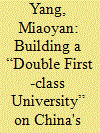

|
|
|
|
|
| Summary/Abstract |
Situated in the broader context of educational aid for Tibet and higher education reform in China, this article examines efforts to develop higher education in the Tibet Autonomous Region (TAR). Based on document analyses, observations and interviews, we interrogate the thoughts and actions of university officials in the TAR when responding to the state's call for the creation of “double first-class” (shuangyiliu 双一流) universities and disciplines. Our study identifies two main strategies adopted by university officials: capitalizing on the plateau's unique geography and China's system of preferential ethnic policies. University administrators hope to use the TAR's unique and strategic location as a springboard for curriculum and research development, while drawing on aid and assistance from the central government and partner universities. We conclude that the future of higher education in the TAR is highly dependent on external assistance and that the region faces an uphill battle in building a truly world-class university.
|
|
|
|
|
|
|
|
|
|
|
|
|
|
|
|
| 4 |
ID:
178225
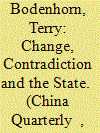

|
|
|
| 5 |
ID:
178232


|
|
|
|
|
| Summary/Abstract |
This paper examines several research questions relating to equality and equity in Chinese higher education via an extended literature review, which in turn sheds light on evolving scholarly explorations into this theme. First, in the post-massification era, has the Chinese situation of equality and equity in higher education improved or deteriorated since the late 1990s? Second, what are the core issues with respect to equality and equity in Chinese higher education? Third, how have those core issues evolved or changed over time and what does the evolution indicate and entail? Methodologically, this paper uses a bibliometric analysis to detect the topical hotspots in scholarly literature and their changes over time. The study then investigates each of those topical terrains against their temporal contexts in order to gain insights into the core issues.
|
|
|
|
|
|
|
|
|
|
|
|
|
|
|
|
| 6 |
ID:
178226


|
|
|
|
|
| Summary/Abstract |
China implemented an unprecedented expansion of higher education along with excellence initiatives that propelled more universities into the global rankings. Yet, the international influence of the higher education system pales in comparison to its economy. This paper argues that governance reforms in higher education only partially address the increasingly complex social and geopolitical realities. With more institutional and professional autonomy, universities and the academic research enterprise would be better placed and more inclined to find innovative solutions to urgent problems of domestic and global sustainability.
|
|
|
|
|
|
|
|
|
|
|
|
|
|
|
|
| 7 |
ID:
178236


|
|
|
|
|
| Summary/Abstract |
This article uses data gathered from a survey that probed the career orientations and values of more than 1,000 law students in Beijing, Hong Kong and Taipei to examine the legal professionalism of future lawyers being trained under different legal education systems in Greater China. Our findings suggest that these future lawyers have a “materialistic” career orientation, although those studying in a system whose legal education goal is to train professional lawyers are more inclined to pursue professional legal ideals, and those trained in a system that emphasizes legal ethics are more likely to pursue public interest issues. On the basis of the findings, we argue that legal education systems in Greater China, while different in their traditions, share the same need to strengthen legal professionalism by according greater emphasis to legal ethics in their respective law school curricula.
|
|
|
|
|
|
|
|
|
|
|
|
|
|
|
|
| 8 |
ID:
178234
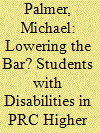

|
|
|
|
|
| Summary/Abstract |
In the People's Republic of China, the 2015 (revised) Higher Education Law provides that citizens enjoy the right to receive higher education. That legal ideal, however, is not easy to implement in practice. One important issue in higher education is the extent to which in law and in practice the educational rights and interests of students with disabilities are realized. In anticipation of difficulties, the same law specifically requires Chinese higher education institutions to enrol disabled students who meet the relevant admission qualifications and it explicitly prohibits rejection on grounds of disability. Admission standards and processes, however, remain a problem, as do social attitudes to disability, and other difficulties persist in securing the rights and interests of disabled persons in higher education. The complications that arise remain significantly under researched and are not explicitly addressed in the Higher Education Law. Proposals for reform are not likely to succeed without substantial changes in societal and governmental attitudes.
|
|
|
|
|
|
|
|
|
|
|
|
|
|
|
|
| 9 |
ID:
178228
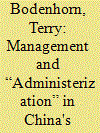

|
|
|
|
|
| Summary/Abstract |
Scholarship on university autonomy in China's higher education system in the past three decades has focused on the macro-relationship between the party-state and university leadership. This paper focuses instead on university-level management practices and college-level academic autonomy. Drawing on the discourse of “administerization” and “de-administerization” within Chinese academia, we demonstrate how the dual administration system and outdated management practices common in the higher education system limit academic quality and educational autonomy at the college level.
|
|
|
|
|
|
|
|
|
|
|
|
|
|
|
|
| 10 |
ID:
178227
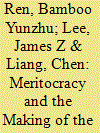

|
|
|
|
|
| Summary/Abstract |
This article takes advantage of three new big historical datasets to identify four salient features of the Chinese academe during the Republic of China. First, it was highly international in terms of training. Second, the proportion of female students was unexpectedly large. Third, there was a heavy emphasis on STEM subjects. Finally, the social and spatial origins of China's university students and university faculty members changed from a national population of civil servant families to business and professional families largely from Jiangnan and the Pearl River Delta. The datasets are the China University Student Dataset – Republic of China, which includes almost half of all students to graduate from a Chinese university during the first half of the 20th century; the China University Student Dataset – Overseas, which includes the vast majority of all Chinese students to graduate from a North American, European or Japanese university during this same period; and the China University Employee Dataset, which includes almost all university faculty members in China, 1941–1950.
|
|
|
|
|
|
|
|
|
|
|
|
|
|
|
|
| 11 |
ID:
178231


|
|
|
|
|
| Summary/Abstract |
Based on archival material and interviews, the paper argues that the autonomy of Hong Kong's institutions of higher education has varied since 1911, with the colonial state initially exercising tight control and relaxing it especially as the transfer of sovereignty over Hong Kong approached. China has sought to reassert control especially since 2014 in what continues to be contested space.
|
|
|
|
|
|
|
|
|
|
|
|
|
|
|
|
| 12 |
ID:
178230
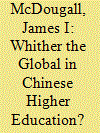

|
|
|
|
|
| Summary/Abstract |
Since the 1990s, not only have China's universities become more in line with global standards but they now set them in some areas. This paper looks at how the production of space in Chinese higher education is employed in “new era” China to manage contested sites of globalization. From the spatial practice of scholarship to the representational spaces that map the educational bureaucracy, the production of space in Chinese higher education helps to organize social relations. This paper argues that the production of space in Chinese higher education is used to manage conflicts between global flows and localization as well as to serve national priorities. The paper contributes to ongoing discussions of the globalization of higher education and cultural studies of space and spatiality in contemporary China.
|
|
|
|
|
|
|
|
|
|
|
|
|
|
|
|
|
|
|
|
|